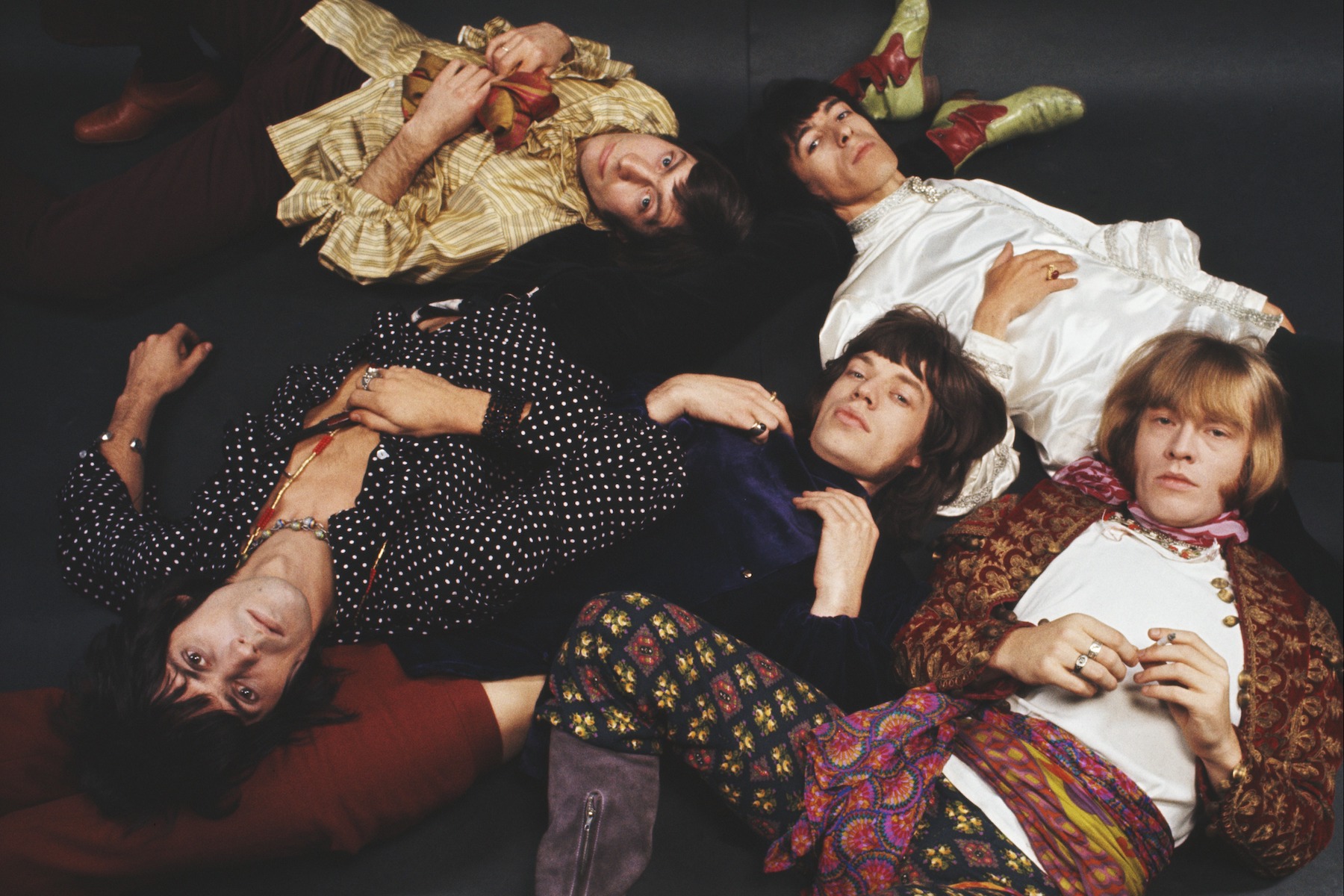 Ask Bill Wyman what people should expect from The Stones and Brian Jones , documentarian Nick Broomfield’s new film about the late, doomed founder of the band, and he’s pretty straightforward about it: “The truth, the whole truth, and nothing but!”
Ask Bill Wyman what people should expect from The Stones and Brian Jones , documentarian Nick Broomfield’s new film about the late, doomed founder of the band, and he’s pretty straightforward about it: “The truth, the whole truth, and nothing but!”
That may be a slight exaggeration, but there’s no denying that the documentary , for which the former Rolling Stones bass player was a “historical consultant,” delves into the highs (laterally and figuratively) and lows of the man who started the Stones but never lived past the Sixties.“He was the heart and soul of the Stones,” Broomfield says in his narration, “but today most people have never heard of him.” At this point, Jones may be most notorious as the first major rock star to die at 27, the launch of a tragic and mysterious club that would come to include Jimi Hendrix, Kurt Cobain, Jim Morrison, and Amy Winehouse.
For those unaware of his contributions, The Stones and Brian Jones (which will play in theaters one night, November 7th, before a wider release on November 17th) gives Jones the props he earned.We’re reminded that he essentially started the band when he was all of 19, was its blues-purist soul in its early days, and added a defining soupcon to some of their most beloved songs, be it the flute on “Ruby Tuesday,” the marimba in “Under My Thumb,” or the sitar in “Paint It Black.” (Wyman’s favorite, he tells RS ? The Mellotron Jones played on “2000 Light Years From Home.”)
As far as the overall arc of Jones’ life, Broomfield sticks with the basics.Raised by a disapproving father who made his son feel as if he was throwing his life away by starting a rock band, Jones both rebels against authority and yearns for his parents’ approval.“I don’t want to spoil the movie for anyone by naming specifics,” Wyman tells RS , “but there were a few things that really touched me, including some things about Brian’s childhood that Nick discovered that I didn’t already know.” Those might include the fact that Jones’ father kicked him out of the house when his son was only 17 or that his parents never saw Jones play live, which is profoundly shocking and surely contributed to his self-esteem issues.
Watch an Exclusive Clip From The Stones and Brian Jones :
A dedicated student of blues and R&B, Jones relates to both Black music and society’s underdogs, and it was his newspaper ad calling for band members that led Mick Jagger and Keith Richards , who’d already jammed with him, to his door.Nominally the leader of the Stones, Jones is soon overtaken by them, Jagger especially, and finds himself adrift — drowning himself in drugs and alcohol before actually drowning in the pool at his British estate in 1969.(For anyone wondering, Broomfield, who explored the theory that Cobain was murdered in 1998’s Kurt & Courtney , does not subscribe to the theory that Jones was the victim of foul play, detailed in Danny Garcia’s 2019 doc Rolling Stone: Life and Death of Brian Jones.)
Once he was forced to leave home, Jones also had a habit of moving in with a family of a young woman he knew, getting that girl pregnant, and then leaving — which, according to the film, happened at least five times.
In The Stones and Brian Jones , people describe Jones as alternately sweet, gentlemanly, insecure or self-centered.“All of those words apply,” Wyman says.“Brian could flip from being nice and kind one minute to cruel and mean the next.He was also brilliantly clever — more so than the rest of us —but he often inadvertently made the wrong decisions, to his detriment.”
Even after so many decades, it’s still surprising to see how deeply Jones was invested in the Stones, even answering most of their fan mail himself.
“When I joined, Brian was setting up our shows, deciding which songs we played and recorded, and signing all the management and recording contracts,” Wyman says.“Brian was making all the creative and business decisions on behalf of the band during this time.” Related Reality Winner Is Hollywood’s New Muse.And She Won’t See a Dime Matthew Perry’s Radical Honesty About His Addiction Battle Helped Us All Meet the ‘Freak From Behind the Barricade’ Who Produced the New Rolling Stones Album
But the far more charismatic and confident Jagger was increasingly seen as the band’s frontman and leader, especially after the band began working with manager Andrew Loog Oldham.As far as when Jones stated losing control of his band, Wyman says, “I think it was when Andrew started encouraging Mick and Keith to write songs.Unfortunately, this caused Brian to lose confidence in himself as time went on.Brian, Charlie and I stopped doing so many interviews with press, radio and TV, as Andrew thrust Mick and Keith forward into the public eye.”
When I joined, Brian was setting up our shows, deciding which songs we played and recorded, and signing all the management and recording contracts.
Brian was making all the creative and business decisions on behalf of the band during this time.
In an awkward moment captured in a vintage clip, a TV host approaches Jones, assuming he’s the band’s main composer.“I’m not really a writer,” Jones replied, shyly, before the host moves over to Jagger and Richards.We also hear a snippet of a sweet and lovely song Jones tried to write and sing himself, although he cuts himself off just after starting it.“He was totally insecure,” Wyman says, “so he was always worrying what people would think.”
Wyman confirms the legend that he and Jones were likely the closest in the band.“From the beginning I always shared rooms with Brian on the road” he says, “and we often went to clubs and other events together just the two of us, so we naturally became very close.” That bond is in stark contrast to vignettes about Jagger and Richards teasing Jones.In another older interview (the Stones did not cooperate with the film), Jagger admits the band was perhaps “a bit insensitive” when it came to Jones’ contributions or own songwriting.
Richards is heard explaining that fame impacted Jones more than the others and that no one else in the band had the time or maturity to help him out.
The French model Zouzou, one of Jones’ many partners, also claims in the movie (as she did in the Rolling Stone doc) that Jones was increasingly dissatisfied with the music the Stones were making, especially “(I Can’t Get No) Satisfaction.” She recalls Jones telling her they were “writing shit” and said, of that song, “Look at this — it’s vulgar, it’s awful, it’s out of tune, it’s nothing.” Zouzou remembers Jones having crying-jag breakdowns, drinking Scotch and coke all day, and, given the bags under his eyes, asking her if he should get a facelift even though he was all of 24.By the time of the Stones’ Rock and Roll Circus TV special, Jones could barely play the guitar and looked prematurely weathered; its director, Michael Lindsay-Hogg , recalls Jones telling him that the Stones were making his life “a living hell.”
Does Wyman think the Stones could have done more to stop Jones’ downward spiral? “He did go into rehab in July 1967,” Wyman says.“I know because I visited him there.But ultimately it’s down to the person themselves, which can be so difficult, as it was for him.” As Wyman also recalls, “He once stubbed a cigar butt on my hand in the car, then he immediately apologized.He had a good heart but he could also have a wicked sense of humor.”
The Rolling Stones perform on Thank Your Lucky Stars at Alpha Television Studios in Birmingham, England, on January 30, 1965.David Redfern/Redferns/Getty Thanks to old and new interviews with former lovers, The Stones and Brian Jones gets up close and personal, from his earliest, teenage relationships to another girlfriend’s description of Jones as an “insatiable” lover.Zouzou also tells Broomfield that Jones seemed to gravitate toward women who looked like him, especially in terms of matching bangs.“He didn’t like himself,” she says.
“But at the same time, he wanted to have people who looked like himself, which is strange.” Jones could be so charming and courtly that he once talked one of his girlfriends’ parents into allowing her to go on the road with the Stones.
According to the film, Jones’ dark side kicked in when he hooked up with actress Anita Pallenberg , who lent his life an element of glamor and pharmaceutical risk-taking.In a new interview in the doc, Volker Schlöndorff, who directed Pallenberg in the Sixties cult noir Degree of Murder , wonders why she and Jones would trash the curtains in their hotel room rather than simply, say, opening them.In one particularly striking scene, Jones’ former girlfriend Linda Lawrence, in need of money for their son, visits him, but Jones and Pallenberg gaze down at them from a top floor, laugh, and never come to the door.
Leaving Jones for being what Richards calls “an asshole” in the film, Pallenberg switches to Richards—literally going from Jones’ hotel room to Richards’ on the same Cannes Film Festival trip, as Schlöndorff recalls.Jones’ father is heard maintaining that breakup left Jones “morose.” His son’s drinking and drugging excesses certainly did continue, leading to the Stones firing him and his death just weeks later.
Given that Jones’ death took place 54 years ago — and that, as Broomfield says, he’s largely unknown outside of hardcore Stones fans — why are we still analyzing his brief life? “Brian was a staggering musical talent who contributed to the creation of many masterpieces,” Wyman says.
“His legacy will continue for a long time to come.”
Jones’ lost promise could be another reason: Here, Eric Burdon of the Animals calls him “a bit of a genius,” and Jones’ work with the Moroccan group The Master Musicians of Joujouka, released after his death, revealed he was ahead of the curve when it came to rockers recognizing world music.Or maybe he’s now simply a metaphor.Jones’ death came just a few months prior to the horrific Altamont festival, which came to symbolize the death of whatever remained of the Sixties dream by December 1969.In the way Jones lost himself in a haze of fame, substances, and insecurity, The Stones and Brian Jones makes the case that he was a one-man Altamont of his own.
Trending Priscilla Presley’s Payout from Lisa Marie Presley’s Estate and Burial Plans Near Elvis Approved by Judge .
